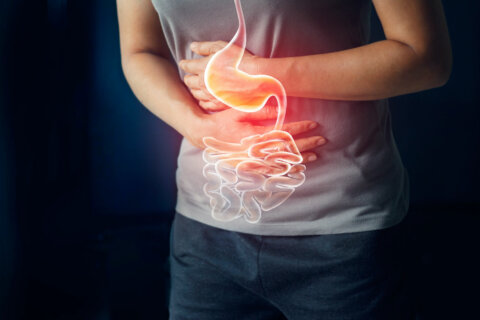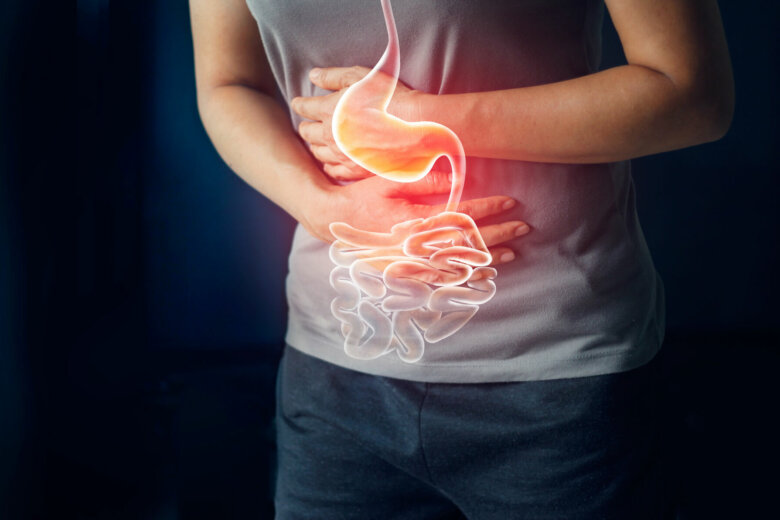
“Why does my stomach hurt?” It’s a question doctors hear all the time, and it can be tricky to answer. That’s partly because people sometimes use the term “stomach” to mean anything in the digestive tract (which includes many organs), and partly because something that feels like stomach pain in the upper abdomen may be caused by another organ.
“One of the first problems we have to confront is the fact that the gastrointestinal tract isn’t smart in telling us where the problem is coming from. Narrowing it down to the stomach as opposed to the small intestine or colon can be very difficult,” says Dr. Eamonn Quigley, head of gastroenterology and director of the Lynda K. and David M. Underwood Center for Digestive Disorders at Houston Methodist Hospital.
Add those challenges to the fact that there are many potential answers to “Why does my stomach hurt?,” and you and your doctor may have some detective work ahead.
Sudden stomach pain
Some stomach pain comes on suddenly. It may be temporary and resolve on its own, or it may be more serious and require medical attention. Five common causes of sudden stomach pain include:
1. Overeating. If you eat too much, you may experience stomach bloating and distention to the point of discomfort.
2. Eating foods that trigger gas production. Some foods like beans or apricots contain sugars called FODMAPs (fermentable oligosaccharides, disaccharides, monosaccharides and polyols), which are harder to digest and trigger the production of gas and lead to bloating and distention.
3. Stomach flu. Symptoms of stomach flu (also known as viral gastroenteritis) show up suddenly. “Viral gastroenteritis can cause stomach pain, nausea, vomiting or diarrhea,” says Dr. Pascale M. White, a gastroenterologist and director of the gastroenterology clinic at Mount Sinai.
4. A perforated ulcer. An untreated sore on the lining of the stomach (an ulcer) can worsen and create a hole that allows stomach acid to leak. “You may have had minor ulcer symptoms, and then suddenly excruciating pain and you feel terrible. It can be very worrying,” Quigley notes.
5. An inflamed organ elsewhere in the digestive tract. Any time an organ is inflamed, it can hurt, and sometimes the stomach feels it first. For example, inflammation of the pancreas, which sits behind the stomach, may be mistaken for stomach pain; inflammation of an appendix can also be interpreted as stomach pain. “In the early stage, the pain is felt in the center of the abdomen — not in the right, lower part of the abdomen where the appendix is,” Quigley says. Another common inflamed organ is the gallbladder. This is a result of gallstones blocking drainage of the gallbladder leading to an infection. Gallstones that don’t lead to infection can be a cause of chronic pain.
Chronic stomach pain
Some stomach pain can be ongoing. It may come and go, but doesn’t seem to stay away long and may require a visit to the doctor. Five causes of chronic stomach pain include:
1. An ulcer. Having a sore on the stomach lining causes a burning or gnawing pain, especially when you’re not eating — stomach acid can fuel irritation.
2. Heartburn. The fiery feeling of acid refluxing up into the esophagus can sometimes feel like pain in your stomach. It may have a pattern of always appearing after you eat or every time you wake up. “Usually patients who have reflux and don’t know it complain when they get up in the morning. It’s because they were lying flat and acid in the stomach has refluxed into the esophagus and pooled there, which can irritate the esophagus and cause the sensation of stomach pain,” White explains.
3. Gallstones. Little “stones” or clusters of hardened materials that form in the gallbladder can cause stomach pain if they block bile from draining out of the gallbladder or block the duct that leads from the pancreas. While gallstones are common sources of acute pain, they can also become chronic.
4. Poor circulation. “When you eat, you need more blood supply to your intestines. If you have narrowed arteries in the GI tract (maybe because you have vascular disease), you’ll have stomach pain,” Quigley says.
5. Irritable bowel syndrome. “Just because your pain is in the upper part of the abdomen, it doesn’t mean it doesn’t relate to the lower bowel. The colon is actually located in both the upper and lower parts of the abdomen,” Quigley points out.
Less common causes of chronic stomach pain include slow stomach emptying (gastroparesis) and stomach cancer.
Seeking help
When asking, “Why do I have stomach pain?” it helps to consider how much pain you have and how long you’ve been experiencing it. “The severity and duration of your symptoms matter,” White says.
White recommends going to an emergency room if you have sudden, severe pain. What does that feel like? “Severe upper abdominal pain will not allow you to function. If you’re stuck in bed, can’t get up, you’re fatigued, you haven’t eaten, you have a fever, you can’t keep food down — that’s severe,” White says.
For pain that’s not severe but has been going on for a few days or more, White recommends seeing your health care professional as soon as possible.
What if you’re experiencing new stomach pain that’s uncomfortable but not severe? White suggests keeping close track of your symptoms and giving your body a little time to resolve the problem. New pain that’s uncomfortable but not severe but persists for more than 24 hours can be a serious condition. Seek urgent care if symptoms don’t resolve in 12 to 24 hours.
If you have a good idea of the type of pain you’re experiencing, it might be OK to take an over-the-counter remedy, such as famotidine for heartburn. But stay away from certain drugs that can cause problems when you have stomach pain, such as:
— Pain relievers associated with stomach irritation and bleeding known as NSAIDs (nonsteroidal anti-inflammatory drugs such as ibuprofen, naproxen or aspirin).
— Proton pump inhibitors (such as omeprazole), which could interfere with further tests should you seek a doctor’s help for stomach pain.
Finding the cause
If you seek medical care, a health care professional will likely ask a lot of questions about your stomach pain. “We try to put together a number of features of the pain that, when taken together, may allow us to narrow the options,” Quigley says.
For example, a doctor may want to know:
— Where exactly is the pain? “For example, if pain is in the middle of the upper part of the abdomen, that really is something in the stomach itself or the lower part of the esophagus,” Quigley says. “If it’s on the right side under the ribs, that’s where the gallbladder is.”
— Did the pain come on suddenly or have you had it before? Longtime pain could indicate an ulcer or heartburn. Sudden, severe pain could indicate something very dangerous, such as a perforated ulcer or an appendix that’s about to burst.
— Which words best describe the pain? For example, if you say it’s a burning pain, a doctor may think of acid reflux.
— Is stomach pain better or worse after you eat? This may indicate an ulcer.
— Does the pain wax and wane? That could indicate a bowel obstruction.
— In addition to experiencing stomach pain, have you been losing weight or become anemic (low in red blood cells)? “That’s a worrisome combination that could be stomach cancer or cancer of the pancreas or colon,” Quigley says.
— Does the pain make you feel like you need to have a bowel movement? That’s a classic feature of irritable bowel syndrome.
Have answers ready, if possible. For example, you might describe heartburn pain by saying, “When I wake up every morning, and after I eat a meal, I always have a burning pain right in this spot,” and point to a location. Those specifics can help speed the diagnosis, which could include a blood test, ultrasound or procedure (under anesthesia) to look inside the stomach, called an upper endoscopy.
Once a cause is diagnosed, treatment can relieve your pain. Then, hopefully the question, “Why does my stomach hurt?” could become a thing of the past.








